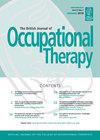Development of a clinical hand rehabilitation guideline for second to fifth metacarpal fracture rehabilitation: A Delphi method
IF 1.3
4区 医学
Q3 REHABILITATION
引用次数: 0
Abstract
Introduction:Metacarpal fractures are viewed as minor injuries, potentially leading to reduced hand function and productivity, especially in working-age people. The study aimed to develop and finalise a second to fifth metacarpal fractures clinical hand rehabilitation guideline.Methods:A three-round eDelphi method, employing REDCap questionnaires and informed by a previous clinical hand rehabilitation guideline, facilitated expert consensus. Experience and qualifications guided expert selection. Consensus was defined as 75% or more experts selecting four or five on a Likert scale or ‘yes’ in ‘yes/no’ questions. Open-ended responses were incorporated, following Conducting and Reporting of Delphi Studies recommendations.Results:Fifteen experts specialising in hand injury management, including orthopaedic surgeons, occupational therapists and physiotherapists, were invited to participate, with attrition of one expert in three rounds. In Round 1, 10 (28.5%), Round 2, 6 (18%) and Round 3, 16 (36%) guideline statements were accepted. Consensus was reached for including grasp types in rehabilitation; activities of daily living (ADLs) types under light, medium and heavy categories; time when early active mobilisation should commence and splint types after conservative management, K-wires and surgical fixation.Conclusion:The finalised clinical hand rehabilitation guideline based on the Occupational Therapy Intervention Process Model (OTIPM) framework may benefit occupation return.为第二至第五掌骨骨折康复制定临床手部康复指南:德尔菲法
导言:掌骨骨折被视为轻伤,可能导致手部功能和生产力下降,尤其是对工作年龄段的人而言。该研究旨在制定并最终确定第二至第五掌骨骨折临床手部康复指南。方法:采用三轮 eDelphi 方法,使用 REDCap 问卷并参考之前的临床手部康复指南,促进专家达成共识。专家的选择以经验和资历为导向。75%或以上的专家在李克特量表中选择4或5,或在 "是/否 "问题中选择 "是",即为达成共识。结果:15 位专门从事手部损伤管理的专家(包括矫形外科医生、职业治疗师和物理治疗师)应邀参加了讨论,在三轮讨论中,有一位专家流失。第一轮有 10 份(28.5%)、第二轮有 6 份(18%)、第三轮有 16 份(36%)指南声明被采纳。在以下方面达成了共识:康复中的抓握类型;轻、中、重度类别下的日常生活活动(ADLs)类型;早期积极活动应开始的时间以及保守治疗、K线和手术固定后的夹板类型。
本文章由计算机程序翻译,如有差异,请以英文原文为准。
求助全文
约1分钟内获得全文
求助全文
来源期刊

British Journal of Occupational Therapy
REHABILITATION-
CiteScore
2.20
自引率
15.40%
发文量
81
审稿时长
6-12 weeks
期刊介绍:
British Journal of Occupational Therapy (BJOT) is the official journal of the Royal College of Occupational Therapists. Its purpose is to publish articles with international relevance that advance knowledge in research, practice, education, and management in occupational therapy. It is a monthly peer reviewed publication that disseminates evidence on the effectiveness, benefit, and value of occupational therapy so that occupational therapists, service users, and key stakeholders can make informed decisions. BJOT publishes research articles, reviews, practice analyses, opinion pieces, editorials, letters to the editor and book reviews. It also regularly publishes special issues on topics relevant to occupational therapy.
 求助内容:
求助内容: 应助结果提醒方式:
应助结果提醒方式:


